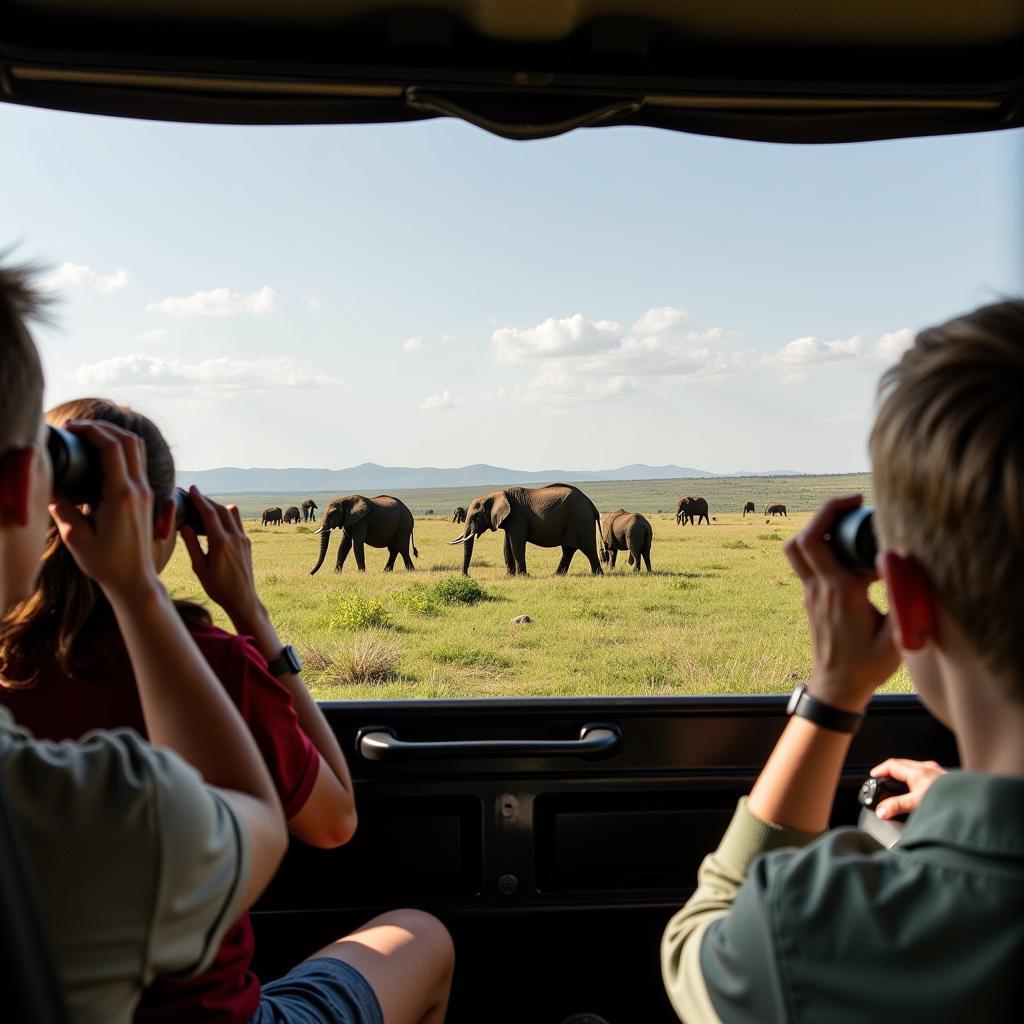African Bull Elephant Attack: Understanding the Risks and Ensuring Safety
An African Bull Elephant Attack is a rare but terrifying event. These magnificent creatures are generally peaceful herbivores, but they can become incredibly dangerous if threatened or provoked. This article delves into the reasons behind elephant attacks, how to avoid them, and what to do if you find yourself facing an aggressive bull elephant in the wild.
Why Do African Bull Elephants Attack?
Several factors contribute to aggressive behavior in African bull elephants, and understanding these is crucial for predicting and preventing potential attacks.
Musth: A Period of Heightened Aggression
One of the primary reasons behind increased aggression in bull elephants is a periodic state known as “musth.” During musth, a bull elephant experiences a massive surge in testosterone, leading to unpredictable behavior and increased aggression. Bulls in musth are easily agitated and may exhibit signs like:
- Secretion of a dark, oily substance from their temporal gland located between the eye and ear
- Urine dribbling
- Ear flapping and head shaking
- Vocalizations like rumbling and trumpeting
While not all bulls in musth will attack, their unpredictable nature makes them potentially dangerous.
Protecting Territory and Offspring
Like many animals, African bull elephants are fiercely protective of their young and their territory. They won’t hesitate to charge if they perceive a threat to either. This protective instinct is particularly heightened in the presence of calves. Approaching a herd with young ones too closely can easily provoke a defensive attack from a nearby bull.
Human-Wildlife Conflict
Unfortunately, increasing human encroachment on elephant habitats has led to more human-wildlife conflicts. Activities like deforestation, agriculture, and infrastructure development force elephants into closer contact with humans, increasing the likelihood of encounters and potential attacks.
How to Avoid an African Bull Elephant Attack
The best way to survive an elephant attack is to avoid one altogether. Here are some tips to minimize your risk when in elephant territory:
- Maintain a Safe Distance: Always observe elephants from a distance, ideally from a vehicle. The recommended safe distance is at least twice the height of an adult elephant, which is around 20-30 feet.
- Be Respectful: Never approach elephants, especially calves, as this could provoke the protective instincts of nearby adults. Avoid making loud noises or sudden movements that might startle them.
- Be Aware of Your Surroundings: When traveling in elephant territory, be vigilant for signs of elephant presence, such as tracks, dung, or broken vegetation.
- Understand Elephant Body Language: Learn to recognize signs of agitation in elephants, such as raised heads, flapping ears, and trumpeting. If an elephant shows these signs, back away slowly and quietly.
- Hire Local Guides: When exploring elephant habitats, it’s always advisable to go with experienced local guides who understand elephant behavior and can guide you safely.
What to Do If an Elephant Attacks
While prevention is key, knowing what to do during an attack can be lifesaving.
- Stay Calm: Panic can lead to irrational decisions. Try to stay as calm as possible and assess the situation quickly.
- Don’t Run in a Straight Line: Elephants can run surprisingly fast. If charged, try to put an obstacle, like a large tree or rock, between you and the elephant.
- Make Yourself Look Big and Intimidating: Shout, wave your arms, and make yourself appear as large and threatening as possible. This might deter the elephant.
- Know When to Stand Your Ground: In some cases, standing your ground and making noise might be enough to deter an elephant. This is especially true if the elephant is making a mock charge to scare you away.
- Climb a Tree or Get to Higher Ground: If possible, climb a sturdy tree or find higher ground. Elephants are not good climbers.
 Tourists observing a herd of elephants from a safe distance
Tourists observing a herd of elephants from a safe distance
Living Alongside Giants: Respect and Conservation
African bull elephant attacks, while frightening, are often a last resort for these intelligent creatures. By understanding their behavior, respecting their space, and supporting conservation efforts, we can minimize conflicts and coexist peacefully with these magnificent animals. Remember, elephants play a vital role in their ecosystems, and their survival is intricately linked to our own.
FAQs about African Bull Elephant Attacks
1. Are African bull elephants more dangerous than females?
While both sexes can be dangerous, bull elephants, especially those in musth, are generally considered more prone to aggression due to their heightened testosterone levels.
2. What is the best way to survive an elephant charge?
The best way to survive an elephant charge is to avoid it altogether by understanding elephant behavior and practicing preventative measures. If charged, try to remain calm, make yourself look large, and find an obstacle or higher ground.
3. Are all elephant charges aggressive?
Not all charges are aggressive. Sometimes, elephants might make a mock charge to scare away potential threats without intending to cause harm.
4. How can I contribute to elephant conservation?
You can contribute to elephant conservation by supporting organizations working to protect elephants and their habitats, spreading awareness about the importance of conservation, and advocating for responsible tourism practices.
Exploring More About African Wildlife
Interested in learning more about the fascinating creatures of Africa? Dive into these related articles:
- African buffalo deadly animals: Discover the formidable African buffalo, another powerful herbivore that demands respect in the wild.
- African black mamba snake: Learn about the venomous African black mamba and its reputation as one of Africa’s deadliest snakes.
- African bull elephant vs lion: Witness the epic clashes between two of Africa’s apex predators, the African bull elephant and the lion.
These resources will provide deeper insights into the diverse and captivating wildlife of the African continent.
Remember, knowledge is key to ensuring both your safety and the well-being of these incredible animals.
Need further assistance or information? Contact us!
Phone Number: +255768904061
Email: kaka.mag@gmail.com
Address: Mbarali DC Mawindi, Kangaga, Tanzania
Our customer support team is available 24/7 to assist you.


